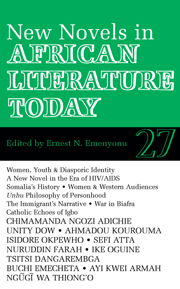Book contents
- Frontmatter
- Contents
- Notes on Contributors
- EDITORIAL ARTICLE: The African Novel in the 21st Century: Sustaining the Gains of the 20th Century
- ARTICLES
- Resurgent Spirits, Catholic Echoes of Igbo & Petals of Purple: The Syncretised World of Chimamanda Ngozi Adichie's Purple Hibiscus
- Ambivalent Inscriptions: Women, Youth & Diasporic Identity in Buchi Emecheta's Later Fiction
- The Interrupted Dance: Racial Memory in Isidore Okpewho's Call Me By My Rightful Name
- The Ivorian Crisis & Ahmadou Kourouma's Posthumous Political Novel Quand on Refuse on dit non
- Ngũgĩ's Wizard of the Crow: Women as the “Voice of the People” & the Western Audience
- The Ankh & Maat: Symbols of Successful Revolution in Ayi Kwei Armah's Osiris Rising
- A New African Youth Novel in the Era of HIV/AIDS: An Analysis of Unity Dow's Far & Beyon'
- The Prison of Nigerian Woman: Female Complicity in Sefi Atta's Everything Good Will Come
- Manufacturing Skin for Somalia's History: Nuruddin Farah's Deep Hurt in Links
- A Zimbabwean Ethic of Humanity: Tsitsi Dangarembga's The Book of Not & the Unhu Philosophy of Personhood
- ‘Coming to America’: Ike Oguine's A Squatter's Tale & the Nigerian/African Immigrant's Narrative
- Chimamanda Ngozi Adichie's Half of a Yellow Sun
- REVIEW
- Index
A New African Youth Novel in the Era of HIV/AIDS: An Analysis of Unity Dow's Far & Beyon'
from ARTICLES
Published online by Cambridge University Press: 05 April 2013
- Frontmatter
- Contents
- Notes on Contributors
- EDITORIAL ARTICLE: The African Novel in the 21st Century: Sustaining the Gains of the 20th Century
- ARTICLES
- Resurgent Spirits, Catholic Echoes of Igbo & Petals of Purple: The Syncretised World of Chimamanda Ngozi Adichie's Purple Hibiscus
- Ambivalent Inscriptions: Women, Youth & Diasporic Identity in Buchi Emecheta's Later Fiction
- The Interrupted Dance: Racial Memory in Isidore Okpewho's Call Me By My Rightful Name
- The Ivorian Crisis & Ahmadou Kourouma's Posthumous Political Novel Quand on Refuse on dit non
- Ngũgĩ's Wizard of the Crow: Women as the “Voice of the People” & the Western Audience
- The Ankh & Maat: Symbols of Successful Revolution in Ayi Kwei Armah's Osiris Rising
- A New African Youth Novel in the Era of HIV/AIDS: An Analysis of Unity Dow's Far & Beyon'
- The Prison of Nigerian Woman: Female Complicity in Sefi Atta's Everything Good Will Come
- Manufacturing Skin for Somalia's History: Nuruddin Farah's Deep Hurt in Links
- A Zimbabwean Ethic of Humanity: Tsitsi Dangarembga's The Book of Not & the Unhu Philosophy of Personhood
- ‘Coming to America’: Ike Oguine's A Squatter's Tale & the Nigerian/African Immigrant's Narrative
- Chimamanda Ngozi Adichie's Half of a Yellow Sun
- REVIEW
- Index
Summary
Few would deny that HIV/AIDS is one of the most pressing issues infecting and affecting Africa and that African literature, which has proudly been a ‘literature of engagement’, must address the problems ‘now, and right now’, to borrow Mandela's phrase (Mandela 2000). What surprises and disappoints readers of African literature is the almost total silence on the part of African literature – or, let us say, ‘serious’ African literature. Most novels dealing with HIV/AIDS are written by lesser known writers, published locally, intended to satisfy local reading needs, and thus can be classified to a degree or another as ‘popular’ literature. One of the few exceptions to this trend is Last Plague written by an internationally renowned Kenyan author, Meja Mwangi. The novel is published in Kenya by East African Educational Publishers, for a purpose. The local publication (even though by a well-established African publisher with international distribution through African Books Collective) ensures effective circulation to the home audience.
What has been ignored at the international level has been espoused at the local level as an increasing number of young adult novels overtly tackle the issues of HIV/AIDS. The lament over a ‘shortage’ (Mitchell and Smith 2003: 513) of youth novels dealing with HIV/AIDS, which was made only five years ago, has now become a thing of the past.
- Type
- Chapter
- Information
- New Novels in African Literature Today , pp. 75 - 84Publisher: Boydell & BrewerPrint publication year: 2009

